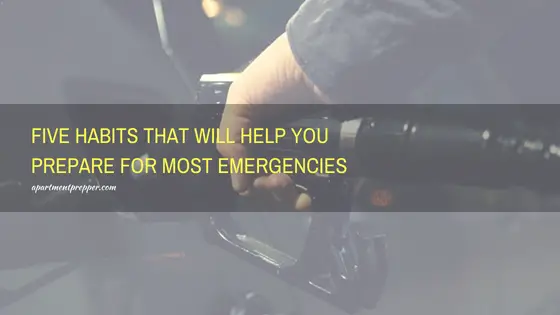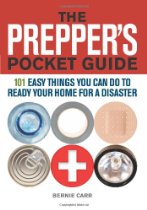This post is by Bernie Carr, apartmentprepper.com
Many people are still reeling from the after-effects of the last disasters. Nearly 10 months after Hurricane Harvey, I still see piles of debris from devastated neighborhoods. This time around another active season is predicted, while a new storm has already hit in Florida. Many residents in the Big Island of Hawaii are threatened by the erupting volcano and many neighborhoods have had to be evacuated. People are taking a fresh interest in getting prepared for emergencies. But it can quickly get overwhelming for someone who is new to preparedness. I know, because I felt a lot of confusion when I first got started.
I also started buying up supplies and gear at a rapid pace and ended up regretting some of my rushed purchases. In hindsight, I would have gone a lot slower and more methodical.
Before going out and spending money on emergency supplies, consider developing a few easy to adopt habits that not only will help you prepare for emergencies but will help you in everyday living.
Keep your gas tank at least at half full.
I used to let my gas tank run all the way down close to empty. Then the nerves would start getting frayed as I searched for a gas station wondering if my car would stall. Not anymore. Since I started preparing, I never let my gas tank run below a quarter, I prefer at least half a tank. This way if there is ever an emergency, I know I can get in the car and at least get out of the city. And if the gas lines were too long, I don’t have to worry about having to fill up right away.
Two is one and one is none.
It’s an old saying about stuff you use all the time- don’t let yourself run out. If your family eats something all the time, let’s say peanut butter, then pick up two when you go to the store. Same thing with toilet paper. Never wait until you are down to the last one before going out to buy more. Ever since I adopted this habit, I never have to make last minute trips to the store.. And if we ever have a hurricane warning, I know I have at least a couple of week’s worth of items that we use all the time.
Keep some emergency cash at home.
Many people no longer carry cash but use their debit cards for all purchase. A bank glitch or any other disaster with a resulting a power outage will cause ATM machines and card readers to go down, leaving you without access to funds. Set aside a few dollars that can help tide you over in case you can’t use debit or credit. The emergency cash stash does not need to be huge, just enough to get your food and other necessities.
Store what you eat, eat what store.
If you buy extra food for emergencies, keep track of expiration dates and use them up before they get old. Resist the urge to buy things just because they are on sale. Buy only what your family eats-there is no point in stocking up on sardines or raisins even if they are on sale if your family does not eat them. A friend of mine found out the hard way – don’t let this happen to you.
Have a paper backup of all your important documents including your phone contacts.
I once had my cell phone charge completely run out in the middle of a conversation. I wanted to call the person back on a landline when I realized her phone number was contained in the cell phone that now won’t turn. Dumb! Luckily I had written her number down on a piece of paper earlier and I was able to find it and call her back. Lesson learned.
The habits described above won’t cost you anything but can save you a whole lot of headaches. At the same time, these habits are helping you get started preparing for emergencies with ease. This list is not all inclusive- what habits are you glad you acquired? Please share in the comments.
About the author:
Bernie Carr is the founder of Apartment Prepper. She has written several books including the best-selling Prepper’s Pocket Guide, Jake and Miller’s Big Adventure, The Penny-Pinching Prepper and How to Prepare for Most Emergencies on a $50 a Month Budget. Her work appears in sites such as the Allstate Blog and Clark.com, as well as print magazines such as Backwoods Survival Guide and Prepper Survival Guide. She has been featured in national publications such as Fox Business and Popular Mechanics. Learn more about Bernie here.
For more preparedness tips, read my book:



always know the BIG 3 list for emergences – water, shelter, food. You always need to have a good supply of water on hand. And some kind of emergence shelter – like a tent or tarps to keep you warm and dry. Food is the 3rd item because you can go a week with out eating.
Hi Ben, Tarp is definitely a good addition to anyone’s preps. Thanks for the comment!
Thanks for the article. Just wanted to point out the image to your book of tips (at the end of the article) is a link to the image, not to the book itself.
Thanks for pointing that out-I corrected the link. I appreciate it.